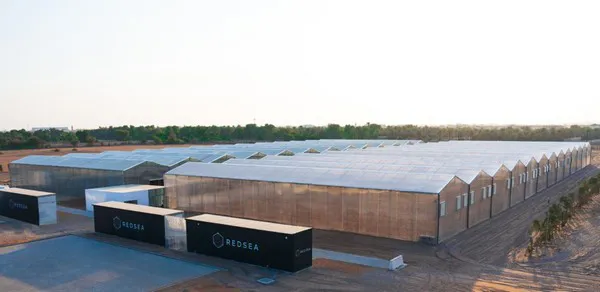RedSea, an AgTech company whose technology enables commercial farming in hot environments, announced earlier this month the commissioning and start of operations at its greenhouse facility in Abu Dhabi. The greenhouse will be a first in the United Arab Emirates and will help diversify food product sources and stimulate the region’s agri-food sectors.
The one-hectare showcase facility is set to encourage wider adoption of the technologies in the UAE for the benefit of local growers and significantly impact Abu Dhabi’s agricultural ecosystem. The project received HSBC’s Living Business award for innovative water management and efficiency.
 “This is a facility to showcase our iyris roof technology made from nanomaterial, which blocks heat while letting light in. It reduces the energy used in the greenhouse while creating more yield,” said Ryan Lefers, Chief Executive Officer of RedSea. “It also helps keep heat in at night. There is still a need for some heating but less. In fact, all inputs are less. Less water, less fertilizer, and less electricity. Our greenhouse team members say it’s a much nicer environment to work in too.”
“This is a facility to showcase our iyris roof technology made from nanomaterial, which blocks heat while letting light in. It reduces the energy used in the greenhouse while creating more yield,” said Ryan Lefers, Chief Executive Officer of RedSea. “It also helps keep heat in at night. There is still a need for some heating but less. In fact, all inputs are less. Less water, less fertilizer, and less electricity. Our greenhouse team members say it’s a much nicer environment to work in too.”
The technologies in the greenhouse include the iyris heat-blocking low-cost roofing, a climate-controlled recirculating deep water culture system for growing of berries, and a saltwater evaporative cooling system functioning without desalination. RedSea’s climate-adapted IoT sensors, which allow remote monitoring and greenhouse management, will serve as the management system.
The greenhouse facility is powered by 2,000m2 of elevated solar panels functioning as agrivoltaics, with protected crops grown under the panels and heat-blocking net. This is a very accessible material for lots of growers. As with the roofs, it keeps the heat out while letting more light in.
Red Sea have built a standard greenhouse alongside to compare results. At their test facility in Saudi Arabia, it has been calculated that the iyris greenhouse used 42% less energy for cooling, and the cost for heating was the same. So the benefits are bigger in the summer when it is very hot.
According to Ryan, the ROI is less than one season.

A global solution
RedSea have teams already working with growers in Spain and Portugal.
“With temperatures rising around the world, this tech can be a solution for growers globally. The shortage we are seeing in Europe just now is a good example. This solution could lower energy costs and make growers more confident about planting in the colder months.
Plant genetics
Plant genetics are also a key element for Red Sea, and they are breeding heat, salt, and drought-tolerant crops. The company is working on rootstock tomatoes, with trials in Egypt and the central valley in California.
“We are targeting heat-resistant plants and expect the first product to be on the market in 2024. When the plants are planted in greenhouses, heat resistance means less cooling is required in the greenhouse. They can also be grown under shade nets and on open ground.”
